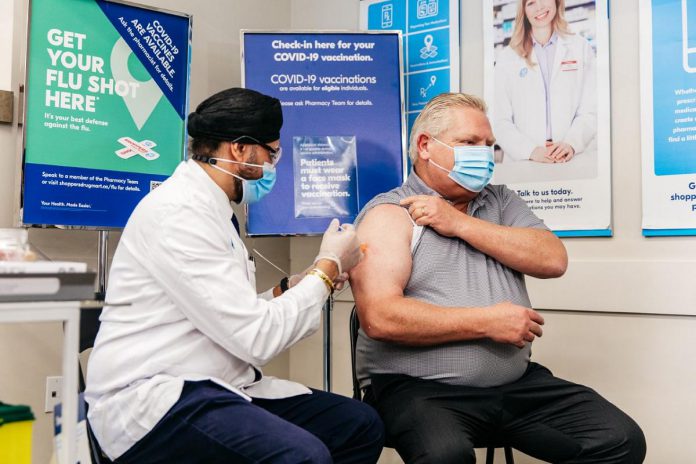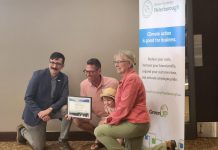
Hours after Ontario Premier Doug Ford received his COVID-19 booster shot, Ontario’s chief medical officer of health delivered a dose of both bad and good news during his weekly COVID-19 update at Queen’s Park in Toronto on Tuesday afternoon (December 21), projecting the rapid growth of omicron will increase hospitalizations but remaining optimistic that students will be returning to in-person learning in the new year.
“Our provincial weekly case incidence rate is 112 cases per 100,000 people,” Dr. Kieran Moore said. “This represents exponential growth of cases in the province, and we are currently tracking to have more cases per day than we have ever had during the entire pandemic.”
Dr. Moore said Ontario’s per cent positivity has been steadily increasing as well, and is currently 7.3 per cent for the week of December 12th to 18th. Hospitalizations have increased by nine per cent, but ICU admissions have been stable.
However, Dr. Moore added he expects to see an increase in hospitalizations and ICU admissions as a result of the spread of the omicron variant, since it is four to eight times more transmissible than the delta variant and is now the dominant strain of the virus in Ontario.
He announced the government would be focusing on protecting the most vulnerable Ontarians by providing case and contact management to the highest-risk settings, including hospitals, long-term care facilities, retirement homes, and other vulnerable congregate settings such as shelters.
“We are prioritizing screening testing, with rapid antigen testing, in these settings to protect the most vulnerable and to maintain critical health care worker capacity to ensure our health care and other critical infrastructure workers can go to work and stay at work safely,” he said.
The government’s intention is to prioritize rapid antigen testing among health care and other essential workers to keep them working, by providing asymptomatic workers with daily testing after a high-risk contact so they can continue working instead of isolating at home.
Dr. Moore pointed out the government administered more than 206,000 doses of vaccine yesterday, and half of Ontarians over 70 have already received their booster doses.
“If we can maintain this momentum of over 200,000 doses a day, that’s a million additional Ontarians a week that would be provided their booster doses,” he said. “I think if you compare us to any other jurisdiction in Canada, we are ahead of all jurisdictions.”
Dr. Moore said that, while it’s still too early to make any conclusions, there is increasing evidence that omicron may not be as virulent as initially feared.
“I’m not seeing a significant severity signal today in terms of ICU use or hospitalization in England,” he said. “We’ve looked at the 4,600 Ontarians that have been confirmed to have omicron … only 15 were admitted to hospital, so that’s a .15 per cent admission rate.”
“Now admittedly, that’s in a much younger population that’s gotten omicron. They’ve gotten it through social activities. They’re in the 20 to 30 age range, which has a low risk for adverse events associated with COVID in general.”
However, Ontario is still preparing for the possibility that hospitalizations and ICU admission will increase as a result of omicron’s exponential spread.
“But even if it’s much less virulent, its attack rate could mean that it spreads so rapidly that it will have an effect on our hospital sector,” Dr. Moore said. “We’re preparing for an increase in hospitalization and ICU utilization, just because of the sheer rapid spread of the virus.”
As to the question whether students will return to in-person learning after the holiday break, Dr. Moore was optimistic that schools will remain open.
“We’re not seeing any significant impact on children’s health,” he said. “We have no children in our pediatric ICUs in Ontario today. So that is very reassuring that this virus doesn’t have severe outcomes in that population. Together with our children from five to 11 — 38.3 per cent have been immunized with their first doses in that age group to date, which I think is brilliant. We’ll continue with first and second dose strategy with that population to further protect them against all strains of COVID-19, including protection against omicron.”
“Together, with all the measures that we have put in place to protect our schools and keep them safe, that’s a very good combination when you have low severity of the illness in children, good protection with vaccination, very good protocols in place to safeguard our schools with ventilation, masking, and we’re actually looking at additional layers of protection for the workers as well as students. We’ve very committed to keeping our schools open.”
While Dr. Moore said it’s ultimately the government’s decision, he has consulted with experts on whether school openings in should be delayed in January and they have said they don’t see a reason to do it right now.
“Certainly we’ll be prudent and cautious, but (there are) very good signals to date,” he said.
In response to a reporter’s question about how long it takes for the booster dose to increase immunity against the virus, Dr. Moore noted that it only takes five to seven days — in comparison to the 14 days after first and second doses.
Dr. Moore acknowledged that Ontarians have pandemic fatigue, but said “omicron is not taking a holiday.”
“In addition to getting vaccinated, please follow the public health measures we know have worked so well to protect us over the last 20 months. They all together provide additional layers of protection against this virus. Remember to keep the size of your gatherings over the holidays small, and attend or organize further gatherings to reduce your total number of contacts.”
Meanwhile, Ontario Premier Doug Ford encouraged all Ontarians to get their booster dose after he received his at an Etobicoke pharmacy on Tuesday morning.
“We have well over 200,000 appointments booked just on the provincial portal, and not mentioning the pharmacy portals and the primary care docs,” he said. “So folks, we’re really gearing up to hit anywhere from 200 to 300,000 every single day, and again I just want to thank everyone who is getting their shots, and everyone who is delivering the shots. It’s the real Ontario spirit, Team Ontario, let’s keep going.”
“Once again, because of the great work these folks do, we will be the world leaders once again, so thank you and God bless everyone, and I want to wish everyone a very Merry Christmas, Happy New Year and Happy Holidays.”


























